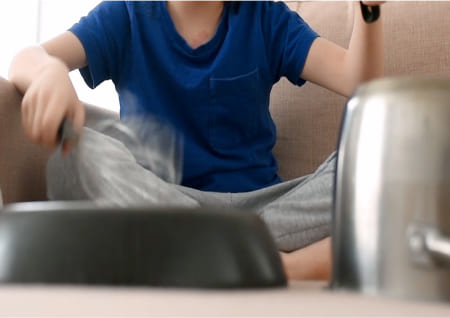Does your child struggle with anxiety or emotional trauma? Do they need to improve communication skills or build problem-solving skills? Does your teen struggle with social skills or relationships with peers?
Music therapy can help.
Does your child struggle with anxiety or emotional trauma? Do they need to improve communication skills or build problem-solving skills? Does your teen struggle with social skills or relationships with peers?
Music therapy can help.
Music therapy is the clinical and evidence-based use of music interventions to achieve individualized goals.
Using musical responses, our music therapists assess emotional well-being, physical health, social functioning, communication and cognitive skills.
Our credentialed, board-certified music therapists create treatment plans to meet non-musical goals including communication, emotional expression, self-esteem and self-awareness, initiation of ideas, and more.
The structured and creative nature of therapeutic musical experiences makes it a powerful tool for individuals to explore and communicate emotions and improve regulation.
Sessions are designed for individuals or groups based on client needs using music improvisation, receptive music listening, song writing, lyrics discussion, and more.
Our data-driven therapy plans provide metrics for care, inform updates and care adjustments to ensure your child/teen continues to make progress. Our music therapists participate in interdisciplinary treatment planning, ongoing evaluation and follow up, per the American Music Therapy Association (AMTA).

Using innovative technologies like interactive audio and video and green screens, our music therapists can ensure engaging, individualized sessions designed to meet your child/teen’s needs and interests. Music teletherapy does not require a family to provide any special materials or instruments, nor does it require previous music experience.
"Teletherapy and music therapy make beautiful partners! We can sing, dance and jam hundreds of miles apart using high-quality microphones and technology -- while supporting communication, cognition, emotional expression, and so much more in the process.
– Melissa Sommers, MM, MT-BC, Board Certified Music Therapist


Our music therapists are all board-certified and credentialed by the Certification Board for Music Therapy (CBMT). Many have extensive experience in pediatric music therapy, and specialize in specific disorders and have advanced training in specific interventions.